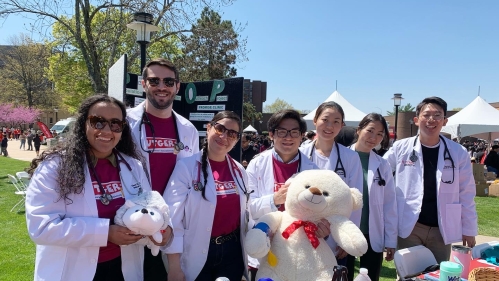
HIPHOP: Community Health Initiative
What We Do
The Community Health Initiative (HIPHOP-CHI) is an initiative under the umbrella of Homeless and Indigent Population Health Outreach Project (HIPHOP). The initiative is a community service student-run program in collaboration with community partners and supervised by Robert Wood Johnson Medical School faculty and staff that provides health profession students the opportunity to take part in service-learning activities and get involved with the Greater New Brunswick area.
The initiative provides opportunities for health care professional students to empower our future patients. Our programs range from pairing medical students and health professionals at indigent clinics to attending team meetings about HIV prevention and much more; the common link for all our programs is that they allow students to reach out to the community.
The programs offered through HIPHOP-CHI, both within the required curriculum and outside of the required curriculum, allow students to engage in a unique service-learning opportunities where the surrounding community becomes the classroom. Our books and lectures will make us health professionals but our involvement in the community can help make us healers.
Who We Are
Accordion Content
-
Program Director
Susan Giordano
Email: susan.giordano@rwjms.rutgers.edu -
Student Director
- Sanya Ravoori
Student General Manager
- Ganghyun (Nick) Kim
Community Health Education Collaboration (CHEC) Student Coordinators
-
Gabriela (Gabby) Cano
-
Abbie Chan
Transitions of Care (TOC) Student Coordinators
-
Michelle Yao
-
Adriana Diaz
Community Health Navigation (CHN) Student Coordinators
-
Julianne Marsh
-
Rishika Voruganti
New Initiatives/Research Student Coordinators
-
Akul Umamageswaran
-
Shreya Sinkar
Project Outreach Student Coordinators
-
Kimberlee (Kim) Sibilia
-
Natalie Riebe
Fundraising/Donations Student Coordinator
- Sree Gogineni
Issues in Cultural Competency and the Underserved Community Elective/Students Interested in Restoring Community Health (ICCUCE/SIRCH) Elective Student Coordinator
- Neal Dalal
Literacy Initiative for Students Teaching Older Spanish Speakers (LISTOS) Elective Student Coordinator
- Hifsa Abbasi
Patients At/In Risk (PAIR) Elective Student Coordinator
- Rose Rasty
Students Teaching AIDS To Students (STATS) Elective Student Coordinator
-
Riddhi Jadhav
-
Student Director
- Maya Iglesias
Student General Manager
- Pooja Rao
Community Health Education Collaboration (CHEC) Student Coordinators
-
Drashya Shah
-
Jacqueline Erler
Transitions of Care (TOC) Student Coordinators
-
Saisanjana Vellampalli
-
Maya Moore
Community Health Navigation (CHN) Student Coordinators
-
Aryan Borole
-
Daniel Devine
New Initiatives/Research Student Coordinators
-
Sanika Joshi
-
Josephine Zhang
Project Outreach Student Coordinators
-
Reem Esseghir
-
Joshua Matthew
Fundraising/Donations Student Coordinator
- Shruthi Thiyagarajan
Issues in Cultural Competency and the Underserved Community Elective/Students Interested in Restoring Community Health (ICCUCE/SIRCH) Elective Student Coordinator
- Celina Zhou
Literacy Initiative for Students Teaching Older Spanish Speakers (LISTOS) Elective Student Coordinator
- Namarata Battula
Patients At/In Risk (PAIR) Elective Student Coordinator
- Swathi Vasudevan
Students Teaching AIDS To Students (STATS) Elective Student Coordinator
-
Diana Vitkovska
-
Listed below are some of HIPHOP's community sites:
Contact Us
For more information about the Community Health Initiative or any of our programs, please contact Program Director Susan Giordano at:
Email: susan.giordano@rwjms.rutgers.edu
Phone: 732-235-4198
Our Programs
The programs offered through HIPHOP, both within the required curriculum and outside of the required curriculum, allow students to engage in a unique service learning opportunity where the surrounding community becomes the classroom. Our books and lectures will make us health professionals but our involvement in the community can help make us healers.
Accordion Content
-
CHEC health workshops are integrated into the Community Engagement Service Learning Course (CECIL), a part of the first-year medical school curriculum. First-year medical students will provide workshops at various community sites. These community sites include Big Brothers Big Sisters; Dina’s Dwelling, permanent housing for domestic violence survivors, women, and their children; Youth Advocacy Program; and many more. HIPHOP-CHI student leaders will provide an orientation for student volunteers. Workshop topics include, but are not limited to, substance abuse, tobacco, nutrition, exercise, and sexual health and responsibility, which are presented and evaluated.
-
Transitions of Care is a Patient Centered Medicine-Health Equity (PCM-HE) first-year medical school clinical selective. Students will participate in clinical visits at Robert Wood Johnson University Hospital, conduct social needs screening, provide community resources to patients in collaboration with the medical team, and make follow-up calls, if applicable. Students also attend Medical Teaching Service Interdisciplinary Rounds.
-
Community Health Navigation (CHN) is a Patient Centered Medicine-Health Equity (PCM-HE) first-year medical school clinical selective that aims to immerse students in the real-world challenges faced by patients. In this program, students participate in clinical visits, conduct social needs screenings, and connect patients with community resources in collaboration with the medical team and community health workers at the Eric B. Chandler Health Center. Students will also follow up with patients while receiving firsthand experience in advocating for patients.
-
Students work with the program director to support current initiatives and create new ones, both virtual and on-site. Current projects include:
-
Girls Exploring Medicine and Stem-workshops promoting health sciences
-
Road to Success-mentoring and tutoring high school students
-
Wellness Warriors-wellness health workshops with high school students
-
Juvenile Detention Center-mental and health workshops
-
-
Project Outreach offers numerous short-term volunteer opportunities to medical, physician assistant, social work, and public health students, as well as Robert Wood Johnson Medical School faculty and staff throughout the entire school year. Participants can volunteer with local organizations such as the Food Pantry, Wagner Farms, Elijah's Promise, and Interfaith-RISE to distribute food, assist with blood pressure screenings, perform teddy bear check-ups within the community, and much more.
-
A series of didactic sessions are offered through the medical school, many in partnership with student organizations at Robert Wood Johnson Medical School and/or in collaboration with community leaders from the greater New Brunswick area. These sessions focus on pressing issues affecting underserved populations and provide students with valuable insights into community-centered care. Students who fulfill the requirements for the ICCUCE and/or SIRCH electives will receive transcript notation. Additionally, completion of the SIRCH elective is a prerequisite for eligibility to pursue Distinction in Service to the Community (DISC).
-
Students in this program are trained to provide health literacy workshops related to exercise, nutrition, heart-healthy behaviors, heart-related conditions, healthy habits and lifestyles, and will end with an integrative review and anecdotal evaluation. The program was developed to provide a collaborative forum in which students and community members could interact while enhancing proficiency in each other's language, understanding of their varied cultures, and how these experiences may enhance overall health care relationships for future health providers and patients.
-
This service elective includes several community-centered advocacy and support programs and/or collaborations. Examples include:
-
Students attend the Robert Wood Johnson AIDS Program team meetings to learn from the interdisciplinary team about caring for this patient population.
-
Students participate in an ICCUCE lecture to gain insight into at-risk populations.
-
Students volunteer to conduct blood pressure screenings for community members with I-Rise's Global Grace Vans.
-
-
Students in this program are trained to present two sessions of interactive workshops on topics relating to HIV/AIDS, sexual health, and healthy relationships at local public high schools.
Support Our Work
Please donate to assist us in serving vulnerable populations' needs while training and supporting our medical students on the path to become patient-, family-, and community-centered physicians.
Back to School Donation Drive

HIPHOP 5K Run
Each year, Robert Wood Johnson Medical School Homeless and Indigent Population Health Outreach
Project (HIPHOP) sponsors a 5K Fun Run/Walk fundraiser for our programs.
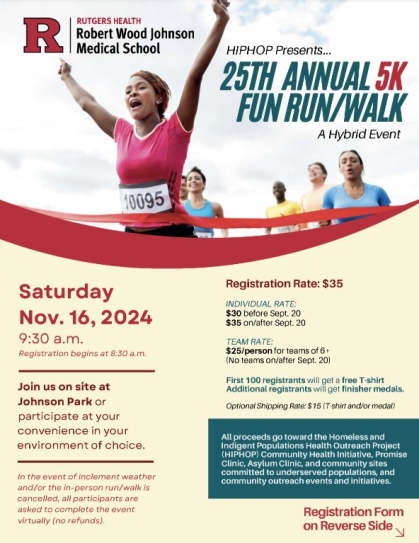
All proceeds from the event support the Promise Clinic, Community Health Initiative, Asylum Clinic, as well as the community sites committed to caring for the needs of the underserved, and community outreach events and initiatives.
Sponsors and Donations
Please donate to assist us in serving vulnerable populations' needs while training and supporting future physicians who are focused on patients, families, and communities.
Make a Donation Read the Donation Request Download the Donation Form
Past Sponsors
HIPHOP thanks our 5K run sponsors for their support each year.
-
Gold
Silver
Bronze
Friends
-
Gold
Silver
Bronze
Friends
-
Gold
Silver
Bronze
Friends
-
Gold
Maria B. Pellerano and Peter Montague
Vanguard Charitable Endowment Program/Steve Levin, MD, and Renee Levin
The Levine FamilySilver
Carol Terregino, MD
Iris G. Udasin, MD
Stress Factory Comedy ClubBronze
Dan Mehan
Deborah M. Spitalnik, John R. Weingart, and Jeffrey Levine, MD
Heidi L. Copeland
Raritan Valley YMCA
Peiris FamilyFriends
Stop & Shop (Somerset & Highland Park)
Target (Watchung)
Dunkin Donuts (Somerset)
Hansel and Griddle
Starbucks
Sam I Am Bagels
Duck Donuts
Day of Service
Day of Service (previously Volunteer Day) has become a tradition at Robert Wood Johnson Medical School for incoming first-year students. Check out pictures from our past volunteer efforts.
Day of Service 2025






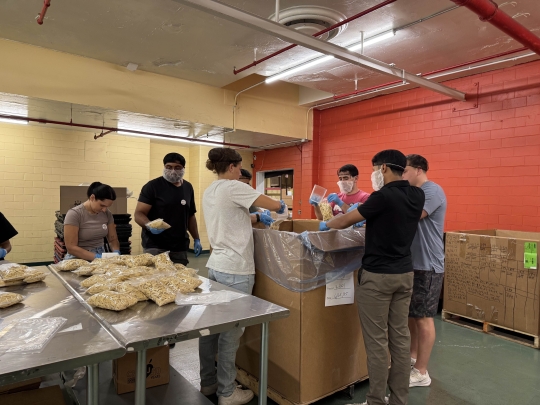







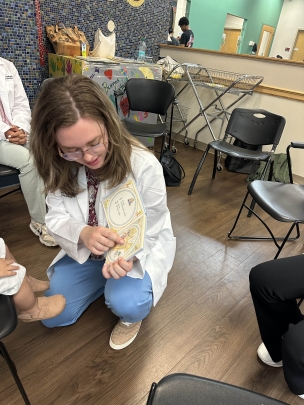
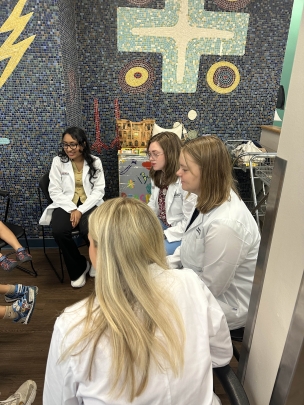









First year medical student volunteers tending a community garden at Wagner Farms.
First year medical student volunteers tending a community garden at Wagner Farms.
First year medical student volunteers tending a community garden at Wagner Farms.
Group photo of first year medical students and HIPHOP-CHI student leaders who volunteered at Wagner Farms.
Group photo of first year medical students and HIPHOP-CHI student leaders who volunteered at Wagner Farms.
First year medical student volunteers and HIPHOP-CHI student leaders packing goods at the Community Food Bank of New Jersey.
First year medical student volunteers packing goods at the Community Food Bank of New Jersey.
Group photo of first year medical students and HIPHOP-CHI student leaders who volunteered at the Community Food Bank of New Jersey.
Group photo of first year medical students and HIPHOP-CHI student leaders who volunteered at the East Brunswick Public Library.
Group photo of first year medical students and HIPHOP-CHI student leaders who volunteered at the East Brunswick Public Library.
Group photo of first year medical students who volunteered at the East Brunswick Public Library.
Group photo of first year medical students who volunteered at the East Brunswick Senior Center.
Group photo of first year medical students and HIPHOP-CHI student leaders who volunteered by preparing food at Elijah's Promise, our local community soup kitchen.
First year medical student volunteers reading books to pediatric patients at Eric B. Chandler Health Center.
First year medical student volunteers reading books to pediatric patients at Eric B. Chandler Health Center.
First year medical student volunteers reading books to pediatric patients at Eric B. Chandler Health Center.
Group photo of first year medical students who volunteered by performing blood pressure screenings at the Global Grace Health Van.
Group photo of first year medical students who volunteered by performing blood pressure screenings at the Global Grace Health Van.
First year medical student volunteers playing games with children at the Kiddie Keep Well Camp.
First year medical student volunteers playing games with children at the Kiddie Keep Well Camp.
Group photo of first year medical students who volunteered at the Kiddie Keep Well Camp.
Group photo of first year medical students and HIPHOP-CHI student leaders who volunteered at the Kiddie Keep Well Camp.
First year medical student volunteers at the Mobile Family Sucess Center.
First year medical student volunteers and HIPHOP-CHI student leaders at the Mobile Family Sucess Center.
First year medical student volunteers and HIPHOP-CHI student leaders at the Mobile Family Sucess Center.
Volunteer Days 2020 and 2021
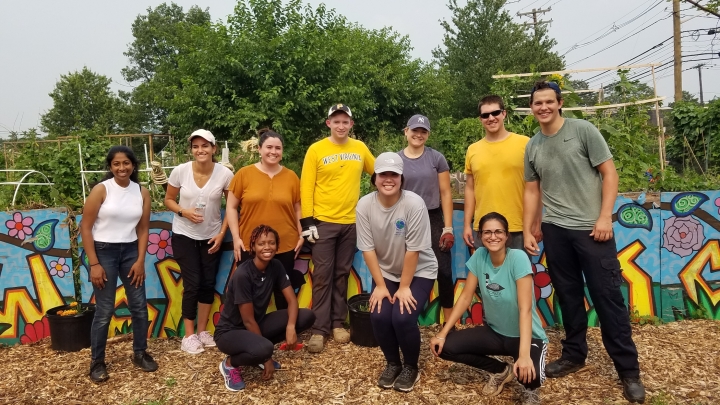
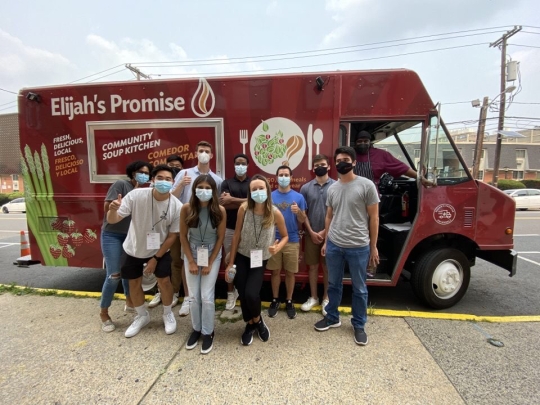
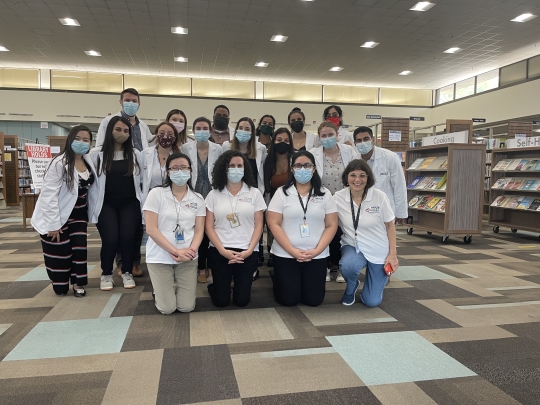
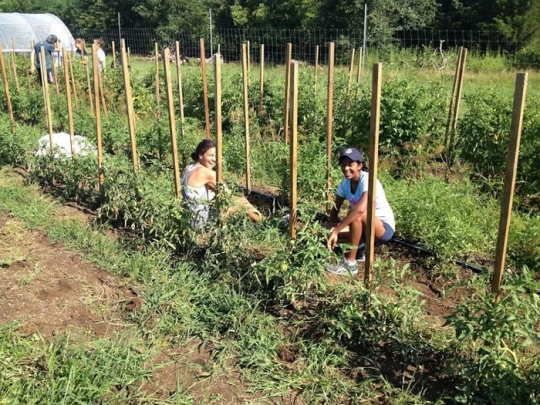
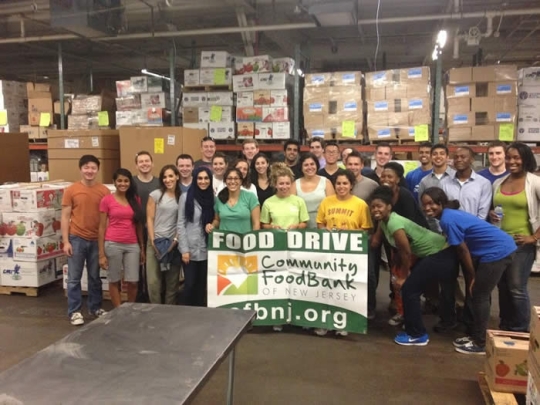
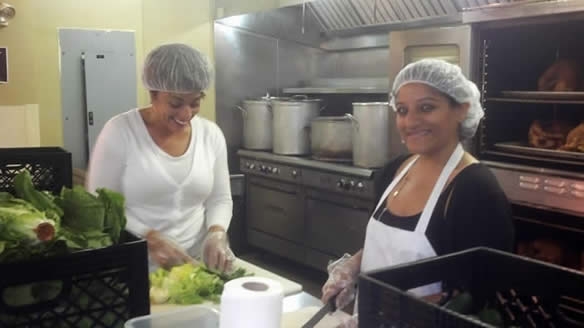
Tending to a local community garden known as the Promise Garden. Around 90 members participated in Volunteer Day in 2021, volunteering over 180 total hours of community service at seven community sites.
Helping at our local community soup kitchen, Elijah's Promise. Around 90 members participated in Volunteer Day in 2021, volunteering over 180 total hours of community service at seven community sites.
"Talk with a Future Doc" Health Literacy Tabling at East Brunswick Public Library on the topic of summer wellness. Around 90 members participated in Volunteer Day in 2021, volunteering over 180 total hours of community service at seven community sites.
Volunteers tending a community garden at Wagner Farm. In 2020, 170 members participated in Volunteer Day, volunteering over 400 total hours of community service at eight community sites.
Students packing goods at the Community Food Bank. In 2020, 170 members participated in Volunteer Day, volunteering over 400 total hours of community service at eight community sites.
Preparing food at Elijah's Promise in New Brunswick. In 2020, 170 members participated in Volunteer Day, volunteering over 400 total hours of community service at eight community sites.
Science Health Day
Science Healthy Day recently became an annual event hosted by HIPHOP-CHI in cooperation with local high school visiting students. Students spent the day learning about topics including anatomy, alcohol and tobacco, higher education, cardiopulmonary resuscitation (CPR), and HIV/STIs. Additionally, these high school students have an opportunity to observe organ model and cadaver demonstrations, as well as a knowledge check at the end of the day through a fun Jeopardy game.
Science Health Day 2025


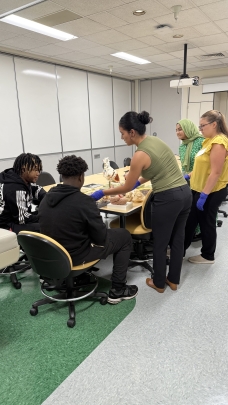

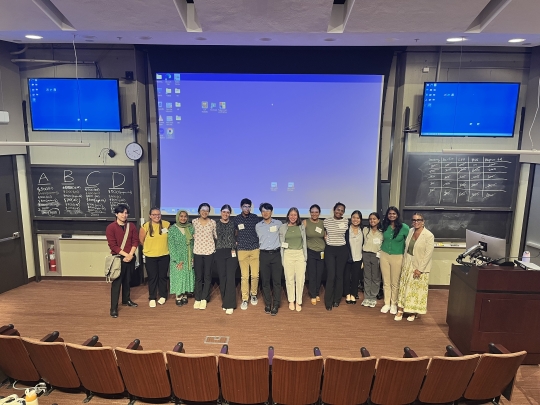
Students participate in a Jeopardy game to test their knowledge on the topics learned on Science Health Day.
Students learning basic cardiopulmonary resuscitation (CPR).
HIPHOP-CHI student leaders explaining anatomy through organ model demonstrations.
HIPHOP-CHI student leaders teaching an alcohol and tobacco informational lecture.
Group photo of HIPHOP-CHI student leaders who helped make Science Healthy Day possible.
Science Health Day 2024
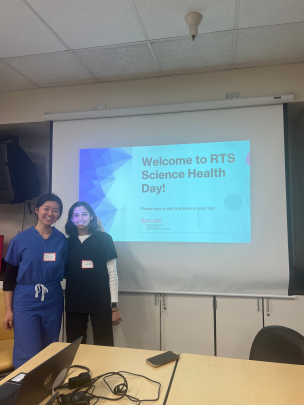
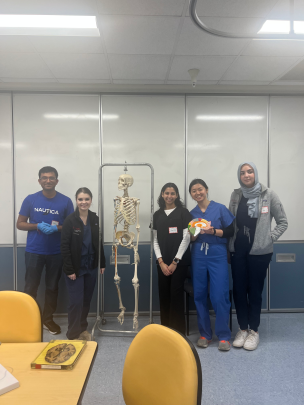

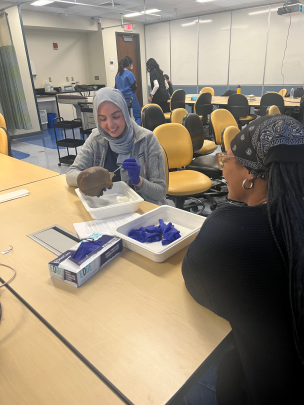
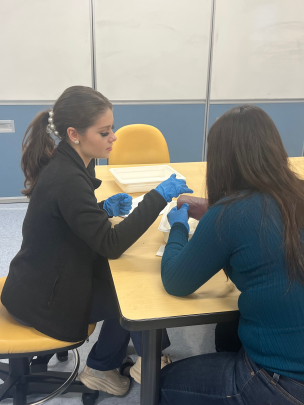
Activity Attendance Tracker
HIPHOP-CHI Social Media
